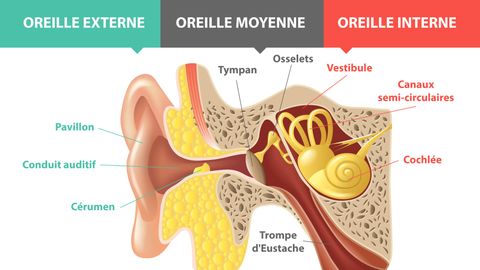Hearing problem/difficulty hearing
Have your friends and family told you that you are hard of hearing? Does it seem like people are mumbling? If the answer to these questions is yes, it is strongly recommended that you take a hearing test. A member of our team can assess your hearing, make recommendations, and refer you to another healthcare professional if necessary. Hearing loss is unlikely to get better or go away over time. On the contrary, hearing is likely to deteriorate further. Fortunately, there are solutions, but we shouldn’t delay! Consult one of our audiologists to improve your quality of life.
Here is a list of situations that could help you spot a hearing problem:
- Having trouble hearing someone speak in a group meeting or in a noisy room;
- Having the impression that several people are mumbling;
- Hearing better with one ear than the other (with or without headphones);
- Asking people to repeat themselves several times;
- Having more difficulty understanding children than adults;
- Having the reflex to always increase the television or radio’s volume, because you can never seem to understand it.
Hearing loss
To understand hearing loss, first of all you need to know that the ear is divided into 3 parts. There are several types of hearing loss depending on the area affected.
Conductive hearing loss
Conductive loss occurs when sound transmission is blocked at the outer and/or middle ear. The problem can occur if there is a plug of earwax blocking the external ear canal, if the eardrum is perforated or retracted, if there is an ear infection, or if the ossicles are sclerotic. Sometimes this can be treated with a medical procedure, surgery, or medication to improve hearing.
Mixed hearing loss
When conductive hearing loss is combined with sensorineural loss, we refer to it as mixed loss. A problem with the outer and/or middle ear is combined with an inner ear impairment.

Tinnitus
Intolerance to loud noises
It is recommended to consult an audiologist when you have an intolerance to loud sounds. A person with hyperacusis hears the sound louder than it actually is. A person suffering with this condition can hardly stand screaming, the sound of dishes being washed, a telephone ringing… If you suffer from hyperacusis, our audiologist will assess your condition and can make personalized recommendations and refer you to an audio prosthetist if necessary.
There are several conditions that can make you intolerant to sounds :
Hyperacusis with hearing loss: This is linked to sensorineural hearing loss that affects the structures of the inner ear and increases the perception of the volume of certain sounds.
Misophonia: This is an intolerance to certain sounds or an inability to ignore everyday sounds, such as someone chewing a meal or the sound of fingers on a computer keyboard. The person may become very irritable or avoid the situation. The condition is linked to psychological disorders present in patients who cannot stand that particular sound.
Hyperacusis without hearing loss : This is hypersensitivity that makes sounds sound louder than they actually are. This inability to tolerate these sounds causes distress and difficulties in everyday life. Hyperacusis is sometimes secondary to acoustic trauma (from a sudden loud noise), head trauma, a period of depression, anxiety or stress, migraines, etc. This can turn into phonophobia (fear of sounds) given the discomfort that the sounds can create. Overprotecting your ears in everyday life could make your intolerance worse. Above all, you need to gradually desensitize yourself and avoid isolating yourself completely.
Ear infections (Otitis)
Otitis externa (commonly known as swimmer's ear)
This is an inflammation of the external ear canal causing edema, pain, itching, and sometimes discharge. Hearing is usually not affected unless the ear canal is completely blocked by secretions. This infection often occurs after swimming (e.g. in a swimming pool, lake, bath, ocean…) or after irritating the ear canal with an object, by cleaning the ear for example. A medical consultation will allow you to obtain antibiotic or antifungal ear drops which will give you relief.
Serous otitis media
Common in children and sometimes affects adults as well. It is often painless but causes hearing loss and a feeling of having ‘blocked’ ears. It occurs when fluid has accumulated behind the eardrum in the middle ear and causes discomfort. It often starts along with symptoms of a cold or flu, or respiratory infection. It can resolve on its own, but it can also become chronic, so it is important that parents pay close attention to the affected child’s behavior. Is he/she playing with his/her ears? Does he/she ask for speech to be repeated? Does speech development appear normal? A full hearing test will determine if there is indeed a blockage in the middle ear and action will be recommended to address the problem.
Acute otitis media
When there is a complication and the fluid behind the eardrum becomes infected with a virus or bacteria, very sharp pain develops with significant hearing loss and sometimes fever. The eardrum shows obvious signs of inflammation and may self-puncture to release infected fluid. A medical consultation is necessary to determine whether antibiotic treatment is necessary.
Child: Language and/or learning disorder
Does your child have language or learning disabilities? Are you considering seeing a neuropsychologist, speech therapist or remedial educator?
It is strongly recommended that you do an assessment to see if hearing loss is the cause.
If your child has a language and learning disability, it is strongly recommended that you have a hearing assessment to see if hearing loss is partly responsible. We work together with neuropsychologists and speech therapists.
